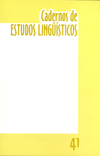Abstract
This article describes how narrators from Brazilian Amazon region configurate oral tradition in two different ways. The first way, called “folk-tale” is characterized considering the fact that narrators, when telling their stories, privilege the dimensions of repetition and stability. The second one, called “oral story”, is characterized considering the fact that narrators, when telling their stories, privilege the dimensions of difference and instability. The present analysis of both configurations takes into account two aspects (i) the enunciative situation in which they were produced and (ii) the textual and discursive strategies developed by narrators. Folk-tales present (i) fixed plots, which are common-shared and (ii) referenciation strategies that do not show the discursive instances in which the stories are produced. Oral stories reconstruct tradition radically. In this way, they do not present fixed plots, what makes possible the emergency of versions that are distant from the formulaic nature of oral tradition. Referenciation strategies present in this second narrative configuration are much more varied and they also make possible the emergency of the discursive instances in which narratives are produced.References
BAKHTIN, M. (1992). Estética da criação verbal. São Paulo: Martins Fontes. (Edição Original, 1979).
BENVENISTE, E. (1988). Problemas de lingüística geral I. Campinas, SP: Pontes: Editora da UNICAMP. (Edição original: 1966)
CALAME – GRIAULE, G. (1965). Etnologie et Langage. La parole chez les Dogon. Paris: Institute d`Etnologie.
CERTEAU, M. de. (1996). A invenção do cotidiano – 1: artes de fazer. Rio de Janeiro: Vozes. (Edição original: 1990).
CERTEAU, M. de. (1995). A cultura no plural. Campinas, SP: Papirus.
ECO, U. (1994). Seis passeios pelo bosque da ficção. São Paulo: Companhia das Letras.
GERALDI, J.W. (1991). Portos de passagem. São Paulo: Martins Fontes.
ISER, W. (1996). O fictício e o imaginário: perspectivas de uma antropologia literária. Rio de Janeiro, EdUERJ. (Edição original: 1991).
KOCH, I.G.V. (1989). A coesão textual. São Paulo: Contexto.
KOCH, I.G.V. (1997). O texto e a construção dos sentidos. São Paulo: Contexto.
KOCH, I.G.V. (1999). Referenciação: construção discursiva. Campinas, SP: Universidade Estadual de Campinas. (mimeo).
KOCH, I.G.V. & MARCUSCHI, L.A. (1998). Processos de referenciação na produção escrita. D.E.L.T.A. V. 14. Nº. Especial, 169 – 190.
MAINGUENEAU, D. (1989). Novas tendências em análise do discurso. Campinas, SP: Pontes, Campinas, SP: Editora da UNICAMP.
MAINGUENEAU, D. (1995). O contexto da obra literária. São Paulo: Martins Fontes.
MAINGUENEAU, D. (1996a). Elementos de lingüística para o texto literário. São Paulo: Martins Fontes.
MAINGUENEAU, D. (1996b). Pragmática para o discurso literário. São Paulo: Martins Fontes.
MARCUSCHI, L.A. (2000). Gêneros textuais: o que são e como se constituem. Recife: Universidade Federal de Pernambuco. (mimeo).
RICOEUR, P. (1995). Tempo e Narrativa. Tomo II. Campinas, SP: Papirus. (Edição original: 1984).
SIMÕES, M.P.S.G. & GOLDER, C. (1995). (orgs.) Abaetetuba conta. Belém: Cejup, Universidade Federal do Pará. - (Série Pará conta; 3).
SIMÕES, M.P.S.G. (1995). Belém conta. Belém: Cejup, Universidade Federal do Pará. - (Série Pará conta; 2).
SIMÕES, M.P.S.G. (1995). Santarém conta. Belém: Cejup, Universidade Federal do Pará. - (Série Pará conta; 1).
WARNER, M. (1999). Da fera à Loira: sobre contos de fadas e seus narradores. São Paulo: Companhia das Letras.
The journal CADERNOS DE ESTUDOS LINGUÍSTICOS is granted all the copyright related to the published works. The originals will not be returned. By virtue of being part of this public access journal, the articles are free to use, with their own attributions, in educational and non-commercial applications

